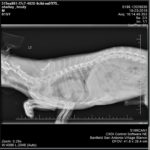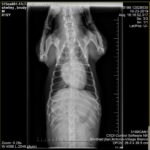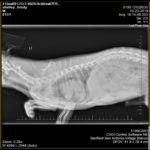hello,
this is tough to answer here. Tough because there is a lot more info needed to get a clear picture of your pup. (like what kind of dog is this and where are you?). so,, i will add a few notes based on previous experience. One, I think the parvo is probably a moot point by now. Sure a probiotic to help a recovering gut is helpful (and always on my prescription menu so ask about this!), but i doubt your pup had parvo,, and if she did she recovered by now,, puppies heal fast. Two,, I keep looking for intestinal parasites until I get 3 consecutive negative fecals. So keep checking. Next, if i had a dollar for everytime some breeder meddled in my treatment plan, and some client had the nerve to ask me to consider their advice or opinion! UGH! it drives me batty! Stop asking your breeder,, they have no business practicing medicine. (Sorry, personal sore spot).
lastly I would recommend you talak to your vet about a maldigestion profile and ultrasound.. or ask for a referral to an internal medicine specialist, I would also ask about things like panacur, tylan powder and cobalaquin. I use these and i/d for the puppies like yours, Lastly make sure your pup is protected from intestinal worms by using a good broad spectrum heartworm preventative. I have had a few pups w chronic hookworms so I can mine on Interceptor Plus year around,., just some points to discuss with your vet (not your breeder!).
let us know what happens.














Good morning???? Don’t give up. Dogs thrive on schedule and repetition. Continue to praise the positive behavior towards your cat that you puppy displays. If he is treat driven, even better. If he sits quietly near her for a short time, treat reward. Gradually increase the time. When you are not busy- perhaps in the evening watching the news or a show, have kitty on your lap or in your sight and puppy in the same room. Quiet may only last a minute or so at first, but that is ok. It will gradually increase. We have a house with three GSD and 1 cat. We make sure that the dogs know kitty is above them in the pack order. She gets fed first, she is allowed on furniture (dogs are not) she is allowed certain places the dogs are not… all of these “other” rules help establish pack order. It takes time and patience, but can definitely be done. Thanks so much for rescuing!!! Don’t give up- it will work out. Best of luck!! ????????
Keep the pup on leash when he and the cat might interact. IMMEDIATE “Leave It” correction any time he so much as looks at the cat to chase. Reward appropriate behavior to ensure there’s direction in what you want.
Not kidding on leaving a leash on him, by the way. It’s the best way to enforce an immediate correction.